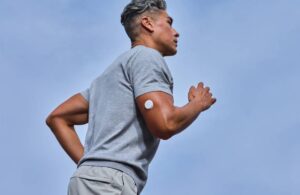
From product launches to major regulatory nods — with significant partnerships and integrations in between — diabetes technology particularly dominated the news over the last 12 months.
Here are the five most-read stories published on Drug Delivery Business News this year:
1. Abbott brings over-the-counter CGM to market
Abbott received FDA clearance for Lingo and its Libre Rio over-the-counter (OTC) continuous glucose monitors (CGMs) in June.
Lingo features a biosensor and mobile app designed for customers who want to improve their overall health and wellness. The company built Lingo on its FreeStyle Libre CGM technology platform.

The company launched Lingo in early September, highlighting the industry’s move beyond prescription CGMs, as Dexcom also launched its own Stelo OTC CGM the week before.
(Abbott Diabetes SVP of Commercial Operations Chris Scoggins spoke to Drug Delivery Business News in June and explained the benefits of OTC CGMs. READ HERE)
2. Roche unveils AI-powered CGM
In an event at the Advanced Technologies & Treatments for Diabetes (ATTD) conference earlier this year, Switzerland-based Roche unveiled its Accu-Chek SmartGuide CGM technology.

The company designed the CGM to address the critical unmet needs associated with managing diabetes and glycemic targets. Every five minutes, the CGM sensor sends glucose values measured in real time to an application. The predictive app then utilizes those values and other available information to detect patterns and predict future glucose levels.
Integrated AI helps to indicate hypoglycemia risk within the next 30 minutes. It also helps to forecast low glucose levels and estimate the risk of nocturnal hypoglycemia.
Roche went on to win CE mark for Accu-Chek SmartGuide in July.
3. Dexcom launches direct-to-watch feature
In addition to some significant product launches for Dexcom, such as its Stelo OTC CGM, compatibility with smart rings, generative AI for CGM, the company caught our readers’ attention with the launch of a direct-to-watch feature for its CGM technology.

In the same article, we covered more news from Dexcom — positive data backing its CGMs and their connectivity to automated insulin delivery (AID) and the launch of Dexcom ONE+ in new geographies.
Studies looking at Dexcom CGM with the Insulet Omnipod 5 and Tandem Diabetes Care t:slim X2 pumps highlighted glycaemic outcome improvements and lower rates for hypoglycaemia and diabetic ketoacidosis, respectively. Meanwhile, Dexcom began the ONE+ launch in Europe, saying the system has now launched in eight markets within one month of first becoming available.
4. Medtronic and Abbott ink diabetes partnership
Two of the biggest names in medtech in general, not just diabetes, joined forces in August, and readers certainly took notice. Abbott and Medtronic announced a partnership arranging for Abbott to develop a CGM sensor and for Medtronic to sell it. This prospective sensor works exclusively with Medtronic devices.

Jared Watkin, EVP of Abbott Diabetes Care, said the partnership “pairs two global leaders in glucose sensing technology and insulin delivery.”
“Our partnership with Abbott allows us to expand access to our advanced automated insulin delivery and smart [multiple daily injection] systems that deliver best-in-class outcomes with the most widely used CGM in the world,” said Que Dallara, EVP and president, Medtronic Diabetes.
5. Tandem Diabetes Care launches new miniature insulin pump
Mobi first captured attention in 2023, when the FDA cleared the miniature insulin pump for people with diabetes ages six and up in July 2023. It made headlines again in February when Tandem launched it in the U.S., marking the rollout of the world’s smallest durable automated insulin delivery (AID) system.

The system has the same Control-IQ technology that powers the established t:slim X2. Control-IQ, an advanced hybrid closed-loop automated insulin delivery feature, predicts and helps prevent high and low blood sugar. It leads to an improved time range throughout the day and night.
“With this launch, we are executing on our strategy to offer a differentiated portfolio of durable insulin pumps, providing choice, along with new options in wearability,” said John Sheridan, Tandem president and CEO.
